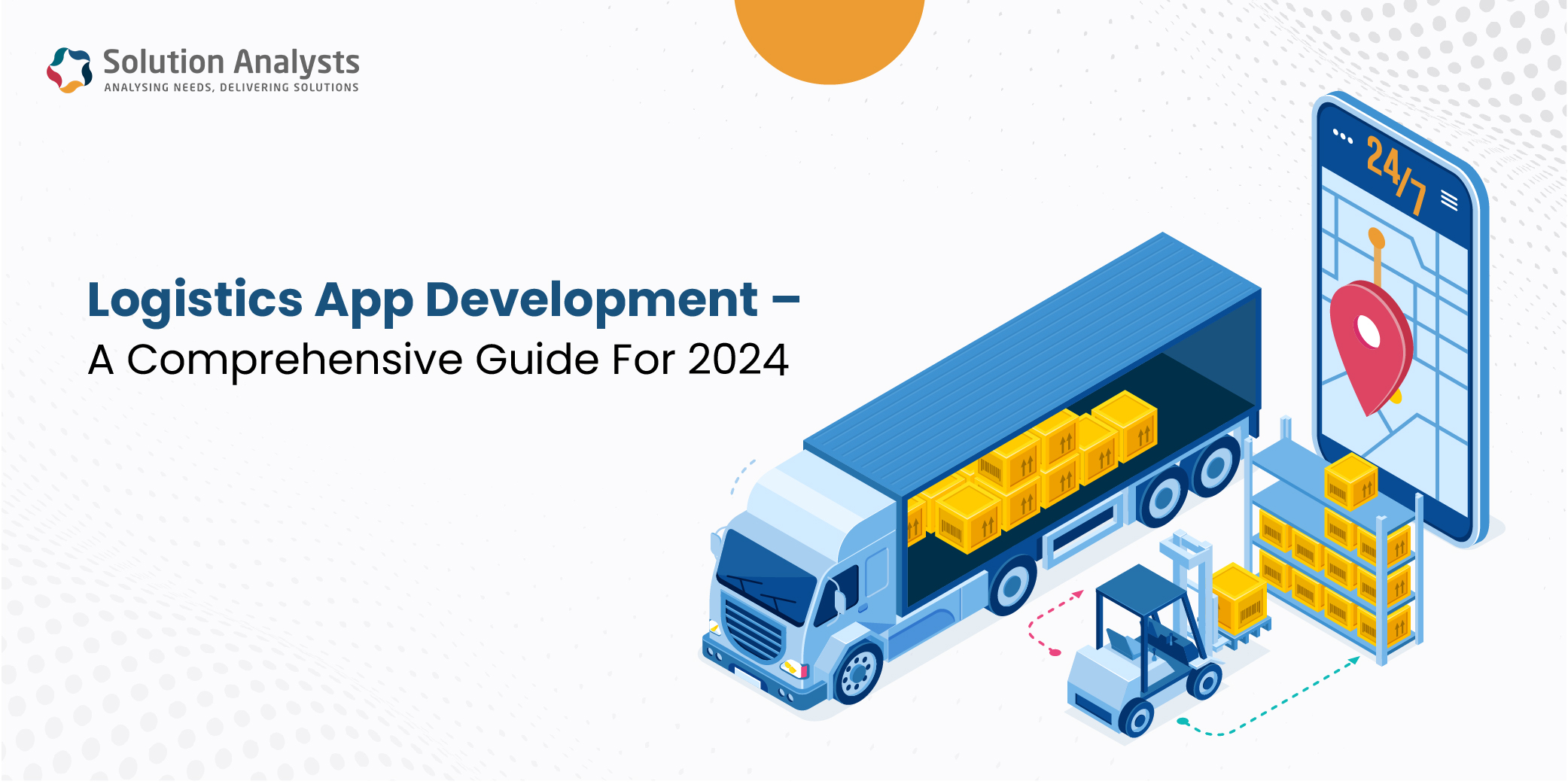
Table of Contents
The logistics industry has come a long way in recent years. Thanks to the advancements occurring in the technology sector. Innovations in the field of AI, Big Data, Artificial Intelligence, and the Internet of Things are boosting the trend of logistics app development services in the year 2024. Different types of logistic mobile applications for Android and iOS are helping logistics and transportation companies overcome industry challenges, such as real-time tracking, route optimization, fleet management, and many more.
This comprehensive guide provides complete A to Z details that will help you understand different aspects of logistics app development, we will cover types of logistics apps, must-have features in the logistics app, the need for a logistics app, and how to develop a logistics application. If you are looking for an answer to how to sell an app idea this guide will also cover opportunities and challenges that you may face when you wish to walk on the journey of logistics app development.
In 2024, digitalization has changed the way logistics businesses work. Suppose you are looking for guidance to understand how to enter or expand the existing logistics business. If you are looking for a guidence, you should take a detailed look at the logistic app development guide 2024. The guide will help you uncover the opportunities if you are trying to answer app developers near me.
Read the complete guide here
Now, let’s move on to discussing the significant steps that are involved in logistics app development:
Logistics App Development Step-By-Step Guide
Define Objectives of logistics app development
The first step in developing a logistic application is to define the objectives behind its creation. It is important to note that logistics is a very vast field, and a focused area can help target specific parts of it with one single app, specific industry, targeted audience, required features. This can serve as a guiding torch behind the creation of industry-specific logistics apps. There are many sectors for which logistic applications can be made, such as:
Procurement
- Packaging
- Warehouse Management
- Freight Management
- Driver & Fleet Management
- Inventory Management
- Shipping
- Last mile delivery
- Returns and Replacement
App Discovery for Logistics App Development
To create a successful logistics app, you should understand your specific business objectives and its scope. Based on that, you should focus on crafting your app development strategy. Having an in-depth comprehension of the requirements will help you come up with the best ideas.
As a result of your research, you could decide on the type of logistics application to build for your requirements. Additionally, the features of the app and its technology stack play a pivotal role in laying a robust foundation for logistics app development.
MVP Development
After you discover your app’s idea, it is time to focus on implementing the ideas in the market, for this, you can consider hiring an MVP app development company. They can assist in building a product and launching it to the market, that will help you to experiment with products and present them to customers with minimum investment and time.
The success of a logistic application depends on the technology and infrastructure that is used to create it, since suceessful mobile phone applications require a solid foundation to adapt to new technological changes, you must explore different frameworks, technologies, and languages to choose the right tech stack.
Apart from choosing the right technology, you also need to look after the security, data privacy, and scalability of your logistic app. The application should be able to handle the growing traffic and avoid getting crashed. It also needs to be secure and safe from cyberattacks and malware breaches, along with complying with data protection as per the country’s regulations.
UI/UX Designing
The subsequent step involves crafting an intuitive, high-quality design that appeals to your end users. Also, you should ensure that the logistics app developer you have hired follows the appropriate app development path.
It is essential to create an intuitive user experience design (UXD) in today’s time, never forget that if the user will find the application challenging to use or navigate, they may abandon using it. The UXD process involves focusing on the user’s needs and expectations and addressing them. An enjoyable, user-friendly app can increase the number of downloads in the Play Store.
- Easy User Flow:
An easy user flow helps the user understand the path of the application, it has to be seamless and easy process to help the users complete their tasks.
- Visually Appealing:
Everyone loves visually appealing interfaces, a good and appealing UI that has clean designs, readable fonts, and beautiful color combinations can make the app worth having.
- Navigation:
The navigation system helps the user to move around inside the application. An easy navigation guides the user to know which path to take to perform a task, while complex navigation systems may deteriorate the user to the wrong path, leading to exhaustion and discomfort.
- Memory Elements:
There are always some memory elements and signages that we recognize and understand the meaning of, such as Home sign, back sign, and profile icon are some of the examples that we can easily recognize, thanks to the use of elemental in all the applications that are developed.
- Feedback:
Receive feedback from your users who are using the app. Continuous iteration is the key to identifying any bugs or issues and resolving them.
App Development
Once you have finalized the app design, the next step involves executing the code of the logistics app development procedure, in this regard, you should employ a proper tech stack and 3rd party apps to introduce the features and screen transitions.
The core features and functionality play as the crucial foundation of the logistic application, it is important to add some of the essential features while the app is created.
- Tracking Shipment:
Tracking shipments in real-time allows users to know the status of the ordered goods.
- Inventory Management:
The inventory management feature allows you to manage orders and supplies, this feature is more useful for businesses and sellers that are managing the procurement of orders.
- Order Status:
To know the status of the order and ensure a positive experience among the users. There are multiple order statuses such as ordered, canceled, on the way, out for delivery, delivered, unable to find location, etc.
- Real-time data:
This allows users to track real-time data. It helps track shipments, inventory, and the status of the order in real time. This helps in making informed decisions so the operations are smooth and sound.
- App Notification:
Push Notifications can be used to send information to the users. Notifications convey the status of the order and provoke the user to open the app. This increases engagement with the app.
- Optimization:
App store optimization can ensure the app runs smoothly. It tests the app thoroughly and boosts its performance.
App Testing and Maintenance
The next step involves having a close check on the app function. Make sure to correct all the bugs to ensure the best-in-class outcomes. Thus, mobile app testing is one of the most important steps to follow before launching the product to the market.
Quality assurance and testing are important to fix any bugs that might occur in the application. Testing helps to improve the overall user experience and reduce downtime. There are many types of testing:
Functional Testing: This type of testing looks after the performance and requirements of the app’s functionality.
Performance Testing: This test allows the app to take the heavy load of many users and function properly under multiple commands.
Usability Testing: This type of testing helps to ensure easy usability of the app.
Security Testing: This testing looks after the security of the app and protects the data of users.
Documentation
Comprehensive documentation is vital for successful app development, testing, and maintenance. It should cover API Documentation Detailed information on APIs, including endpoints and example calls. Testing Protocols: Procedures and tools for functional, performance, usability, and security testing. User Guides: Instructions for end-users to navigate the app. Maintenance Logs: Records of updates, bug fixes, and performance improvements. Well-maintained documentation ensures smoother development, easier onboarding for developers, and an enhanced user experience.
Final Deployment
The final step is deployment, you can develop and release your logistic app at desired platforms, that can be iOS or Android (Google Play). The process of deployment involves uploading the app to app stores and on websites. Once the app is uploaded, you must regularly update it and monitor its performance. You can introduce new features and improvements.
Choose the Platform:
Consider the target audience that will be using the application. Once it is finalized, deploy the application on the required Play Store.
Continuous Testing:
Test the application thoroughly before uploading and deploying it on the Play Store. Make sure no last-minute bugs are remaining in the application.
Performance Monitor:
Monitor the performance of the application after it is uploaded. Check if any issues need to be solved.
Feedback:
Receive the feedback from the users. Implement different methods to gather feedback, such as submitting security patches, error reports, and feedback forms.
Iterate Issues:
Once issues are identified, iterate and remove them quickly. Addressing the issues will increase the positive feedback on the application and boost its performance.
Regular Update:
Every application needs to be updated regularly. The regular update ensures new features and engagement in the app.
Along with that, you should also focus on updating or maintaining the app as per the latest industry trends. This way, you can ensure seamless execution of the app.
What are the key Factors to Take into Cosideration While Carrying out logistics App Development?
There are multiple factors to consider when conducting logistics app development to ensure its success. Let’s have a quick look at some of the significant ones in the following section:
-
Target Audience
The first and most important thing involves having a good know-how of your target audience. As a part of it, you should understand their preferences, pain points, and unique requirements. After you amass all this information, you should focus on customizing the user experience and specific features of your application.
With this, you can make sure that you develop a logistics app that effectively caters to your distinct requirements. It is irrespective of whether it is B2B logistics or B2C last-mile delivery.
-
Integration Abilities for logistics app development
Integration capabilities are another major factor to consider when carrying out logistics app development. In this regard, you should consider integrating your logistics application with external systems. It includes transportation management systems (TMS), CRMs, or ERPs. With this integration, you could streamline the data flow and boost overall efficiency.
-
Scalability
The next factor in our list is scalability. You should first focus on predicting future growth. Depending on this, you should consider designing your logistics application in a manner that effectively handles augmented user traffic.
Along with that, it should also possess the capability to manage data volume. Focusing on the scalability aspect is vital as it helps accommodate expanding operations without compromising performance.
-
Offline Functionality
Offline functionality is another feature you should necessarily implement in the logistic application you plan to develop. You can ensure uninterrupted app usage by enabling offline functionality, especially in areas with poor internet connection. This particular feature again lets drivers access vital information and update data.
-
GPS and Geolocation
You should also focus on implementing GPS and geolocation services. These facilitate the optimization of routes, tracking of shipments, and offering precise delivery estimates. You could effectively boost visibility and improve customer satisfaction with real-time location updates.
-
Security and Data Privacy
Another vital thing involves focusing on the security and data privacy aspects. As a part of it, you should implement the best approaches to protect sensitive data. It typically incorporates financial details, customer information, and supply chain data. Also, you should focus on adopting robust security measures that help prevent unauthorized access and data breaches.
-
Smooth Communication
You should also consider enabling effective communication between various stakeholders. It includes drivers, customers, and support teams. In this aspect, you should implement chatbots, in-app messaging, and customer support features. All of these help in facilitating seamless communication.
-
Customization and Personalization focused on logistics app development
You should never overlook the importance of focusing on the customization aspect. Make sure to provide customization options while building the application. It will help ensure that the app caters to the distinct requirements of various businesses. By offering personalized features and settings, you can make sure to improve user satisfaction and engagement.
Importance of Transportation and Logistics App Development
Gone are the days when customers waited for days to receive their consignment while contacting the logistic service providers occasionally. In today’s data-driven world, the tech-savvy customers want to access all necessary information on the move. There, a mobile app development company can lend a helping hand to logistics and transportation businesses.
Logistics app development can help transporters integrate technological advancements in their process and improve the customer’s experience by providing real-time data anywhere and anytime. From controlling to managing the fleet is possible with feature-rich logistic applications. Let’s discuss the major advantages of transportation and logistic mobile applications.
Major Benefits of Mobile Apps for Transportation and Logistic Businesses –

-
Enhanced Efficiency
Transportation and logistic mobile applications help to streamline the different operational processes. It ensures to automate the different routes and provide real time tracking to the drivers. Mobile apps for transportation and logistics lead to increased efficiency in managing inventory, scheduling deliveries, and reducing overall costs.
-
Real-Time Tracking and Visibility
Mobile applications allow logistics and transportation businesses to track real-time shipment, vehicle, and driver status. This allows customers and several entities to maintain accurate information and keep track of their goods, ensuring increased transparency and reduced delays.
-
Seamless Coordination for Logistics App Development
Mobile applications facilitate seamless communication between drivers, customers, and shippers. Instant apps, updates, and notifications help enterprises to coordinate effectively, exclude errors, and increase customer satisfaction.
-
Data Analytics and Insights
Logistic mobile apps can collect and analyze vast amounts of data, providing valuable insights into key performance indicators, demand patterns, and operational efficiency. These insights empower businesses to make data-driven decisions, optimize operations, and improve customer service.
-
Supply Chain Optimization
App development in this industry facilitates supply chain optimization by integrating various stakeholders, optimizing routes, managing inventory, and ensuring timely deliveries. This leads to cost savings, reduced waste, and improved overall supply chain performance.
-
Warehouse Management
Logistics app development helps in efficient warehouse and inventory management, keep in mind that integrating a logistics app into business operations helps to keep track of every order.The real-time tracking helps to track down the shipments, cargo types, methods of delivery, and delivery schedule.
Types of Apps for Transportation and Logistics Industry

Fleet Management
This app collects fleet-related data and shows the real-time location of vehicles, helping you to manage the fleet through this one-stop mobile app solution. Fleet management application increases vehicle utilization and reduces fuel consumption on the routes including real-time updates of the vehicle, helping in tracking and tracing the vehicle.
On-demand Logistics
Your clients can use your logistics and transportation services as and when they want, this enables you to register orders on a 24/7 basis. On demand logistics apps offer efficient ways to transport the demand of logistics and connect the consumer with the nearby logistic partner so the transaction can be completed as soon as possible. This type of application is famous in food delivery and quick grocery apps. Zepto & Swiggy are famous examples of it.
Warehouse Management
Warehouses play a significant role in managing transportation business, these type of apps are designed to simplify the storage and overall warehouse-related process.
Warehouse apps manage inventory for business optimization it helps you to focus on leveraging the accuracy of the orders, it is notable that these applications are famous in the e-commerce sector. These apps keep track of the inventory and eliminate stockout options.
Real-Time Tracking and Monitoring
This app enables you to monitor and track the driver’s movement and gives you an idea about the route. It is helpful to get real-time updates about the location. Real-time tracking can also help when there is a mishap during the delivery. It provides an accurate location so the driver can be tracked. Quick commerce delivery and food delivery services use it to keep an eye on the drivers.
Supply Chain
The supply chain app streamlines the entire supply chain in logistics. From procurement, refinement to delivery and return, supply chain apps provide visibility to the entire network. Technologies such as Barcode scanning and GPS provide real-time data to integrate the system into the entire value chain.
Driver Management
These apps help manage the drivers who are driving the fleet. It increases fleet operations and optimizes the routes. This promotes safe driving and benefits the company and the driver. Tracking and scheduling leads to reducing vehicle downtime and strengthens the overall operation process.
Delivery Management
Delivery management enhances the operations by providing real time data of the deliveries. They help in improving overall customer satisfaction by planning the delivery schedule. Enhanced customer satisfaction helps in increasing future orders.
Tracking and monitoring for logistics app
It is also possible to integrate these features into a single app, since you have the outline of the types and scope of a logistic app let’s discuss the answers to the most common questions related to the transportation app development process.
Features App Development Company Integrate in Logistic Application Development
Here are some key features for transportation apps targeting different user panels:
Customers:
- User Registration: Allow customers to create accounts and manage their profiles within the app.
- Booking and Scheduling: Enable users to book transportation services, select pickup and drop-off locations, and schedule rides in advance.
- Real-time Tracking: Provide customers with real-time updates on the location and ETA of their assigned vehicle.
- Fare Estimation: Offer fare estimation based on distance, time, and any additional charges to provide transparency to customers.
- Multiple Payment Options: Integrate various payment methods, such as credit cards, mobile wallets, or cash, to offer flexibility to customers.
- Reviews and Ratings: Allow customers to rate and review for drivers and their overall experience, as a result it’ll promote accountability and enhance service quality.
- Customer Support: Provide an in-app support system for customers to contact support agents, report issues, or ask queries.
Drivers:
- Driver Registration: Allow drivers to create profiles, submit necessary documents, and undergo verification processes.
- Ride Acceptance: Enable drivers to accept or decline ride requests based on their availability and proximity.
- Navigation and Route Optimization: Integrate GPS navigation systems to assist drivers in finding the best routes, optimizing travel time, and avoiding traffic congestion.
- Earnings and Reports: Provide drivers with an overview of their earnings, trip history, and performance reports for transparency and performance evaluation.
- Driver Ratings: Enable customers to rate and provide feedback on drivers’ performance, helping maintain service quality and accountability.
- Driver Support: Offer a support system within the app for drivers to contact support agents, report issues, or seek assistance.
- Driver Incentives and Bonuses: Implement a rewards system to motivate drivers and offer incentives based on performance or completing a certain number of rides.
Admins/Operators:
- Dashboard and Analytics: Provide a centralized dashboard for admins/operators for managing and monitor the system, that including trip analytics, driver performance, and user statistics.
- Driver Management: Enable admins to onboard and manage driver profiles, including verification processes and documentation.
- Customer Support: Offer an admin panel for handling customer support queries, resolving issues, and managing refunds or complaints.
- Pricing and Fare Management: Allow admins to set and manage pricing structures, surge pricing, and fare calculations based on different variables.
- Notifications and Communication: Facilitate seamless communication with customers and drivers through push notifications, alerts, and announcements.
- Reporting and Analytics: Generate comprehensive reports and analytics on key metrics like revenue, user engagement, driver performance, and market trends.
- System Configuration and Settings: Provide admins with control over system configurations, settings, and customization options.
- These features can vary based on the specific requirements of the transportation app and the target audience.
Which are the useful technology stacks to build a custom logistic app?
The transportation and logistics apps development services integrate various technology stacks to make a feature-rich app. Here is brief information on the most common technologies used.
- Twilio for registration and authentication
- PayPal for payment gateway
- Twilio for push notification
- MongoDB for storing data
- Hadoop or other related technology for real-time analytics
- AWS or Google Cloud for cloud-based storage
- Front End: Swift, JAVA, CSS, Bootstrap
- Back End: JavaScript, Ruby, Angular, Python
- Application & Data: jQuery, Bootstrap, Angular, Amazon ElastiCache, Groovy, Amazon RDS
- Utilities: Amazon SNS, Heap
- DevOps: Chef
What is the approximate cost of a transportation and logistics app development?
There is not any estimated transportation and logistic app development cost. It totally depends on the logistics and transportation businesses. The cost depends on several factors that include business needs, market trends, and integrated functionalities.
Apart from this, logistic and transportation app development also varies with the different hiring models that companies prefer to hire for their businesses.
At Solution Analysts, we help our clients to full fill all there needs with our two models
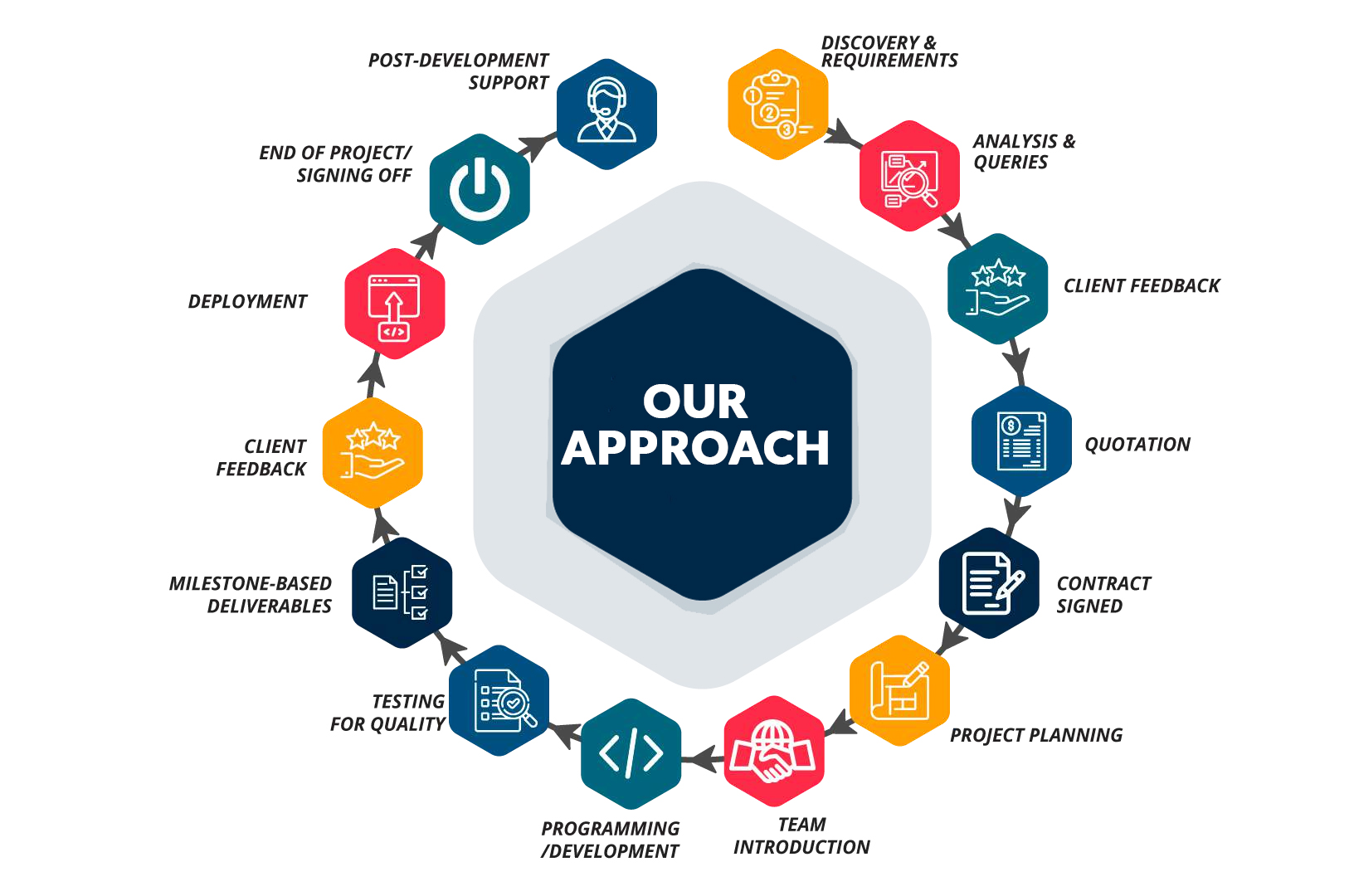
Wrapping Lines
Timely delivery and real-time notifications are two major objectives for a transportation business. Solution Analysts – the leading Logistics app development company can assist different companies to achieve these objectives and improved services. Your customers can get all necessary information on the move with such an app and ultimately, your business can thrive.
FAQs
-
How do you create a logistics app?
The step-by-step guide to create a logistics app include multiple things such as define objectives, app discovery, MVP development, UI/UX design, app development, testing and maintenance, and finally, deployment.
-
What is logistics in mobile application development?
An app that helps to manage logistics processes and helps in transportation, storage, delivery, return of goods can be called a logistics mobile application.
-
How do you make logistics?
To make a logistics app first you need to find a niche audience in the logistics app, look out for competitors and create an alternative that the audience demands.
-
What is logistics in logistics?
Logistics is a French word derived from logistique, meaning detailed coordination of complex operations involving many people and supplies, so the overall process of managing, storing and transporting goods is logistics.
-
How much does it cost to create a transportation app?
It costs roughly between $25,000 and $ 75,000 to create a full-fledged transportation app that has all the necessary features of a logistics app development.







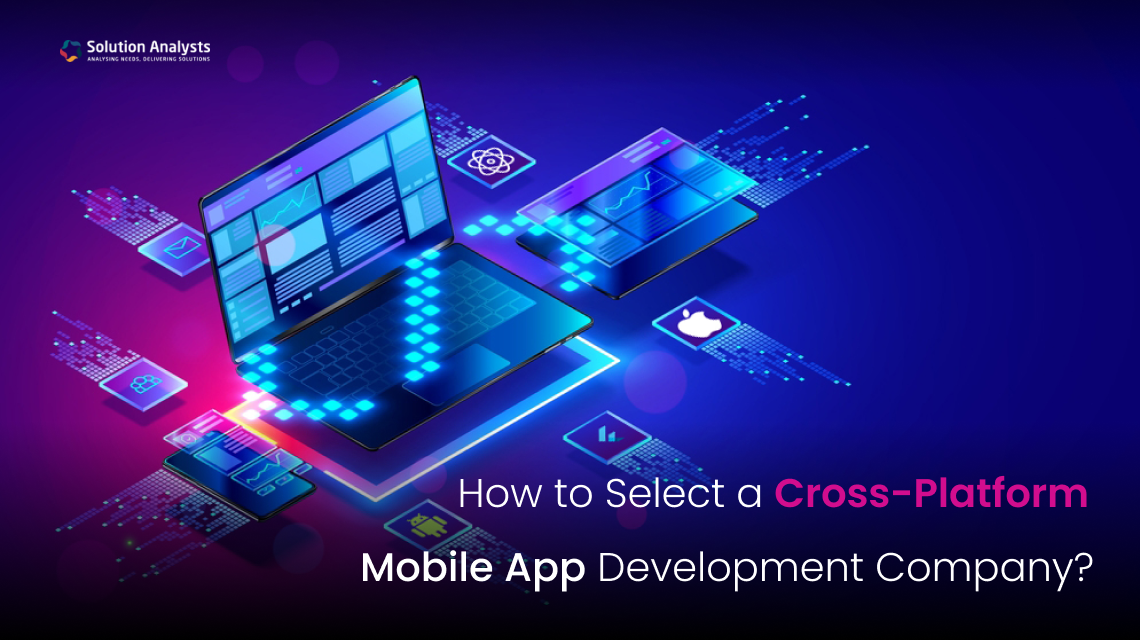

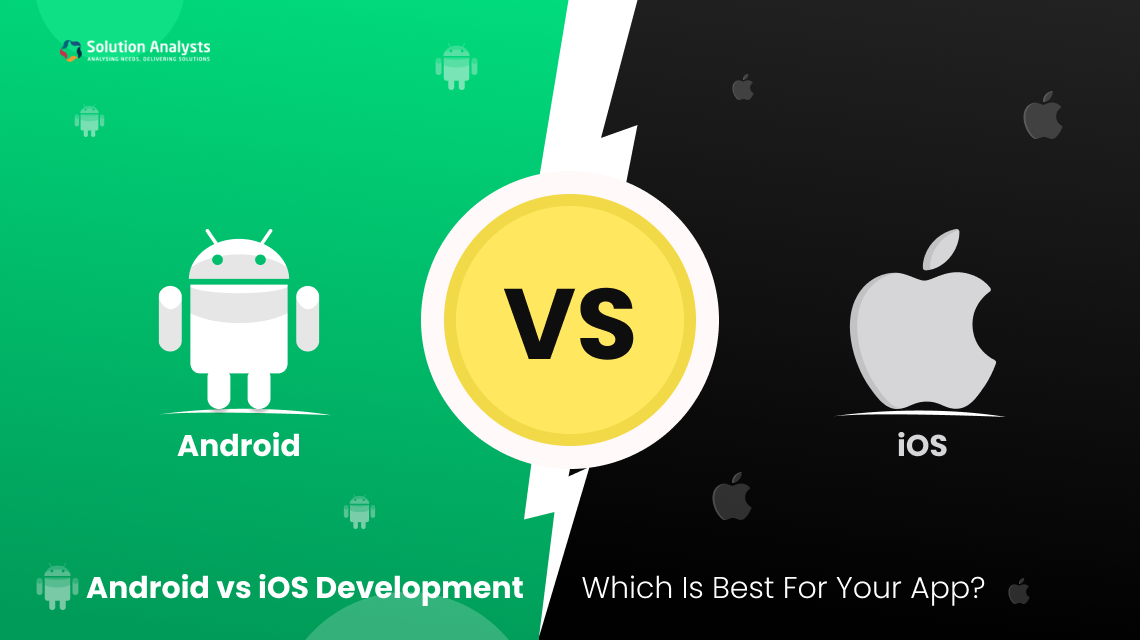
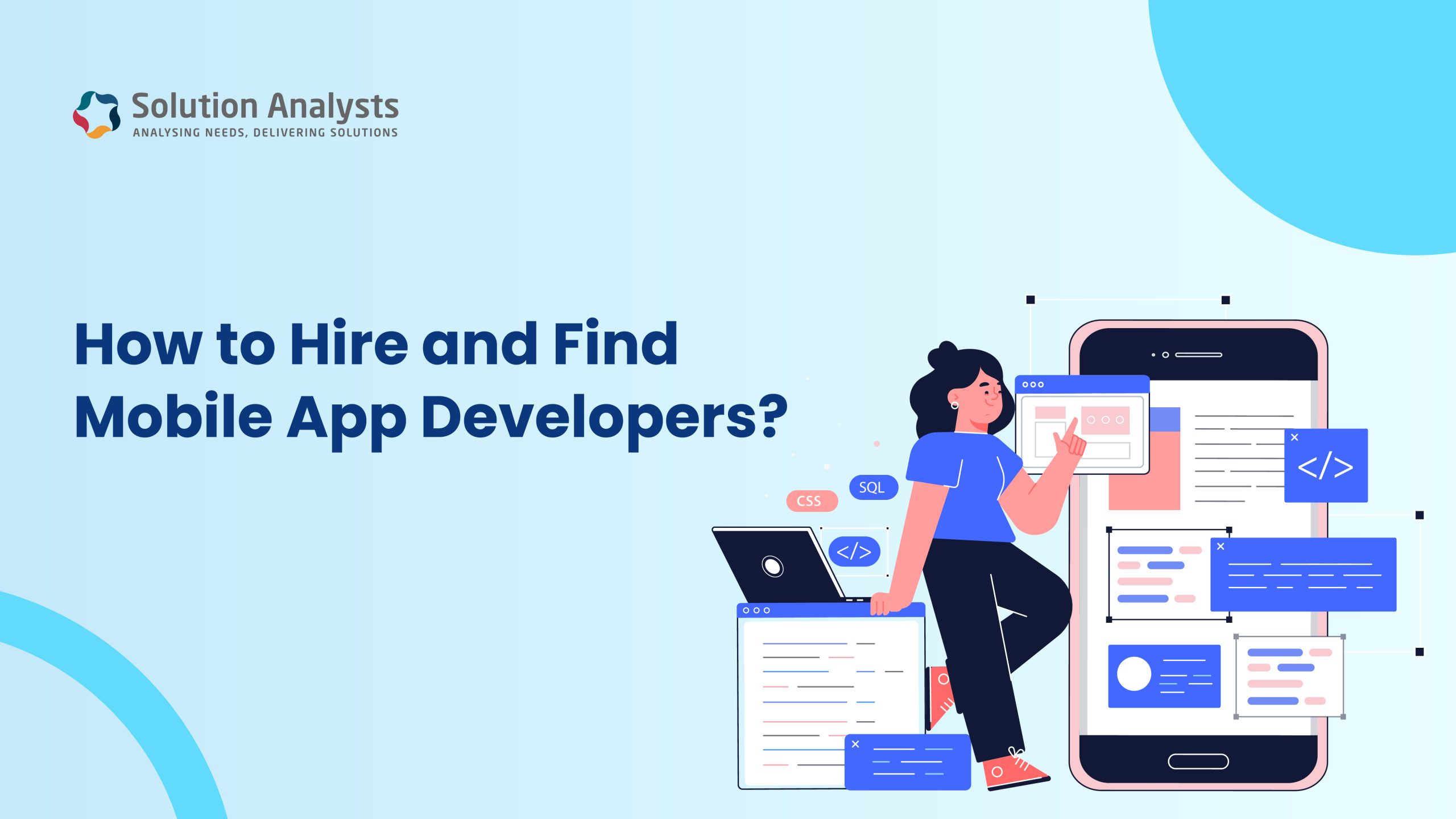
 sales@solutionanalysts.com
sales@solutionanalysts.com biz.solutionanalysts
biz.solutionanalysts






